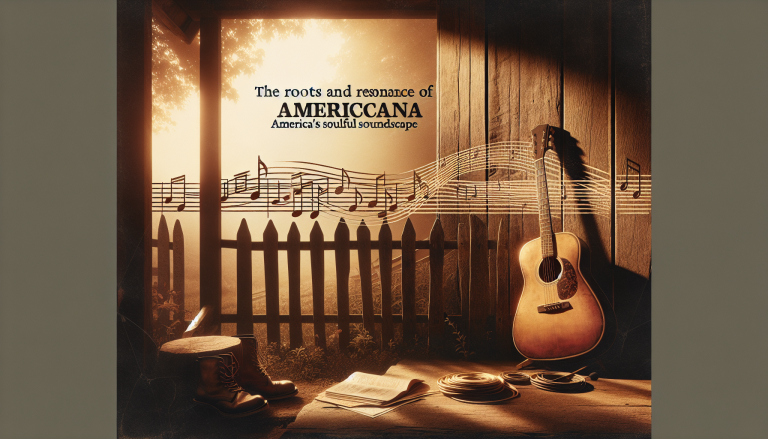The Roots and Resonance of Americana Music: America’s Soul Sound
There’s a particular warmth that radiates from Americana music—a genre steeped in the traditions of American music but brimming with fresh vitality. Americana isn’t just a label or a musical style; it’s a living, breathing narrative that weaves through the heartland of the United States. This genre pulses with the stories of working-class life, migration, hardship, and hope, blending the threads of folk, country, blues, and rock music into a rich tapestry.

Understanding Americana music’s heartbeat means peeling back layers of history. Emerging as a distinct genre in the late 20th century, Americana was birthed from the rusty crossroads where traditional American music genres met the restless spirits of musicians seeking authenticity beyond commercial pop. The 1960s and 70s saw seminal shifts—folk revivalists like Bob Dylan and Joan Baez reconnected audiences to the roots, while outlaw country artists like Willie Nelson and Waylon Jennings challenged Nashville’s polished sheen. These pioneers laid the groundwork for Americana’s ethos: a celebration of American music’s past with a rebellious, re-imagined voice.
A Genre Defined by Heritage and Heart
In essence, Americana music is a broad but tightly knit genre reflecting the diverse cultural landscape of the United States. It draws heavily on folk’s narrative lyricism, country’s twang and straightforward storytelling, blues’ soulful depth, and rock music’s energetic drive. This marriage of styles gives Americana a distinct character, defined by acoustic instrumentation, heartfelt vocals, and lyrics that often explore themes of place, identity, and resilience.
Unlike mainstream country or commercial rock music, Americana resists formulaic constraints. It’s a genre that values roots and originality, frequently incorporating traditional instruments like the pedal steel guitar, fiddle, banjo, and mandolin, often layered with electric guitars and rock rhythms. It echoes a rustic authenticity—raw, vulnerable, but profoundly powerful.
Musically and culturally, Americana music entwines with the American landscape itself. The rolling hills of Appalachia, the dusty roads of the Southwest, the bustling cities’ shadows—all find their voices here. It’s music that tells the story not just of individuals, but of the collective American experience.
Pioneers and Torchbearers: Key Artists Illuminating Americana’s Path
The lineage of Americana is studded with artists who have shaped and expanded its boundaries. The genre’s foundations are often traced to figures like Townes Van Zandt, whose poetic songwriting distilled pain and beauty in equal measure, or Emmylou Harris, who brought a haunting clarity and country sensibility that bridged generations.
Steve Earle is another titan, seamlessly combining rock music’s edge with folk and country’s storytelling tradition. His work resonates with political awareness and raw emotion, as heard on albums like *Guitar Town* and *Copperhead Road*. Lucinda Williams, celebrated for her gravelly voice and gritty, intimate lyrics, has become a vital link in the Americana chain—her 1988 self-titled album pivotal in defining the genre’s sound.
More recently, artists like Jason Isbell and Brandi Carlile have carried the torch into new decades. Isbell’s work, rich in literary allusions and personal vulnerability, brings a fresh narrative potency to Americana. Carlile, with powerhouse vocals and evocative songwriting, pushes the genre’s boundaries further by blending elements of rock music and soul.
Iconic Songs and Albums: Americana’s Timeless Soundtrack
Exploring Americana music is incomplete without immersing oneself in its landmark songs and albums that have become touchstones for generations. Townes Van Zandt’s “Pancho and Lefty” is a storytelling masterclass—its narrative weaving myth and reality in a way that encapsulates the genre’s essence.
Emmylou Harris’s *Wrecking Ball* (1995) revolutionized Americana with its haunting atmosphere and collaboration with producer Daniel Lanois, mixing folk and rock music aesthetics in a groundbreaking way. Steve Earle’s *Copperhead Road* (1988) stands as a gritty anthem blending country roots with rock’s rebellious spirit, telling stories of family, war, and resilience.
More contemporary albums like Jason Isbell’s *Southeastern* (2013) and Brandi Carlile’s *By the Way, I Forgive You* (2018) receive acclaim for their lyrical depth and emotional intensity, reaffirming Americana’s place as a genre that doesn’t just entertain but confronts and heals.
Enduring Impact: Americana Music’s Lasting Legacy
What makes Americana music particularly compelling—and enduring—is its ability to evolve while staying tied to its roots. This genre has become a refuge for artists and fans alike, who crave music that sounds honest and lived-in, resisting the glossiness of mass-produced hits. In an age dominated by digital production and fleeting trends, Americana holds fast as a bastion of storytelling and musicianship.
Americana’s influence extends beyond its niche; it seeps into mainstream country, rock music, and even indie circuits, shaping artist identities and songwriting approaches. Festivals like AmericanaFest in Nashville celebrate this living tradition annually, drawing diverse audiences passionate about authentic American music. The genre also thrives in small venues and coffeehouses, where intimacy and connection fuel the performances.
Moreover, Americana music’s broad embrace of cultural influences reflects the nation’s complex identity. It champions voices and stories often marginalized in broader American culture, providing a platform that acknowledges historic struggles and celebrates the human spirit. This inclusiveness enriches the genre and keeps it relevant across changing times.
In understanding Americana music, one understands a crucial element of American music’s soul: a conversation between past and present, tradition and innovation, roots and rebellion. For those who listen deeply, Americana isn’t just a genre—it’s a journey through the American experience, told in chords and verses, carrying the torch for generations to come.